Swiss Palestinian “appalled” by Gaza fighting
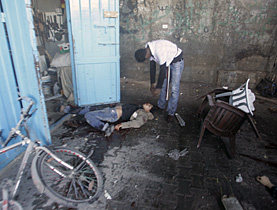
The United Nations has called for a ceasefire after nearly two weeks of fighting in the Gaza Strip which has left hundreds of people dead and thousands injured.
swissinfo spoke to a Palestinian living in Switzerland about the current situation in the Middle East and how he sees the future.
Sami Daher was born in 1959 in Nazareth in Israel. Although he has an Israeli passport, he does not regard himself as an Israeli citizen.
“I cannot be an Israeli, an Arab citizen of the Jewish state, if I have been deprived of the right to my own Palestinian state,” he said.
Daher, a trained psychiatric nurse, lived in Nazareth until 1980. He then came to Switzerland and now has a Swiss passport too. He lives in Solothurn and since 1986 has run a small restaurant there serving Middle Eastern specialities. Most of his relatives live in Nazareth.
On Thursday night the UN Security Council voted in favour of an immediate ceasefire. On Friday, the UN Human Rights Council is due to meet in Geneva to discuss its response.
swissinfo: How do you feel, when you hear and see what is going on in the Gaza Strip?
Sami Daher: I am absolutely appalled. It breaks my heart. I am completely cut up. I am so upset that I am like a baby that can do nothing but cry. I can’t bear to look at the pictures any more. I must build myself some kind of protection in Switzerland against this terrible war.
It’s not the first Israeli aggression. There’s nothing new about houses and schools being destroyed in Gaza. That has been Israel’s practice against the Palestinians for 60 years.
swissinfo: Are you in contact with your family?
S.D.: I had visitors from Nazareth a week ago. There is a huge amount of grief and anger among the 1.2 million Palestinians living in Israel too. There’s a lot of unrest. There are demonstrations everywhere.
It was the same at the outbreak of the second intifada in 2000. And at that time Israeli security forces shot dead 13 peaceful Palestinian demonstrators – and there were no consequences of any kind for the police, although we are Israeli citizens.
swissinfo: The Israelis say Hamas violated the ceasefire and they have to defend themselves against constant rocket attacks on Israeli cities from the Gaza Strip.
S.D.: That is just a pretext. Anyone who has their eyes open can see that 1.5 million people have been living for years in degrading conditions, crammed into a small piece of land, having been driven out of their villages with all their worldly possessions 60 years ago.
In the last two years the Israelis have hemmed the Gaza Strip in even more, blockaded it and turned it into a ghetto where it is now impossible to live a normal life. People don’t even have enough to eat there any more. And they are supposed to be responsible for the war?
Of course I have always regarded the firing of missiles by Hamas – which, by the way, was democratically elected – as idiotic.
swissinfo: The mandate of Palestinian President Mahmoud Abbas is about to end. Can you see a solution to the internal Palestinian conflict between Fatah and Hamas?
S.D.: I am very pessimistic. And I don’t see a solution in the current terrible situation either. Abbas personally, not his Fatah party, has sold himself. He did not represent the Palestinians, only a small corrupt minority who have profited on a personal, financial level from the so-called peace negotiations with Israel.
swissinfo: Do you see no way out of the crisis at the moment?
S.D.: No, unfortunately not. And for that I must lay some of the blame on Europe and in particular on the US. The US has always been on Israel’s side. Washington has vetoed every UN resolution critical of Israel.
And the Europeans do not dare to issue clear condemnations of Israel’s aggressive acts against the Palestinians, let alone to try to stop them. The Palestinians have always been left to fend for themselves.
swissinfo: How do you see the reactions in Switzerland to events in the Gaza Strip?
S.D.: Most people in Switzerland certainly support the Palestinians. I know a lot of Swiss people who are with us, who feel really concerned about this terrible war.
But I don’t see the same thing in the Swiss media. They give much more space to the Israeli side.
swissinfo-Interview: Jean-Michel Berthoud
Hamas emerged in 1987 at the beginning of the first intifada.
The name is the abbreviation for Islamic Resistance Movement, but it is also the Arabic word for “enthusiasm”.
Although its charter calls for the destruction of Israel, leaders have said they are prepared for a long-term truce if Israel withdraws from land captured in the 1967 war.
Most western states regard it as a terrorist organisation and refuse to deal with it.
Hamas won democratic elections in the Palestinian Territories in 2006.
It took power in Gaza in June 2007 after months of fighting with the rival Fatah movement of President Mahmud Abbas, which still runs the Palestinian-ruled parts of the West Bank.
Since then Israel has imposed a tight blockade on the Strip, allowing in only bare essentials.
Hamas has fired missiles at the Israeli town of Sderot; Israel says the current invasion is designed to protect its citizens there.
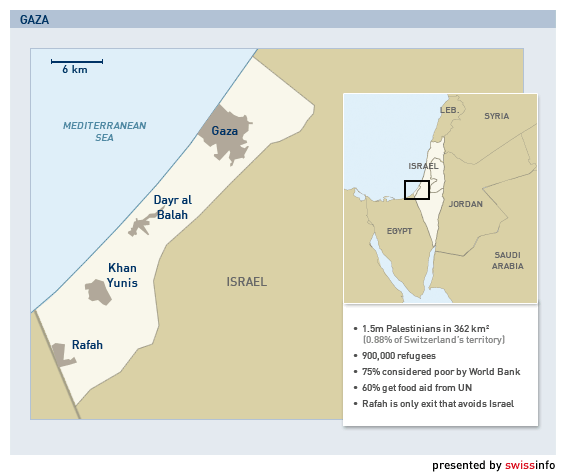

In compliance with the JTI standards
More: SWI swissinfo.ch certified by the Journalism Trust Initiative
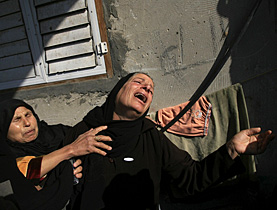
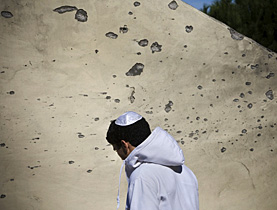
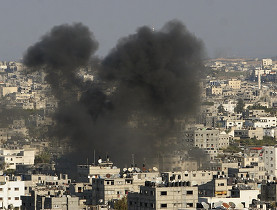
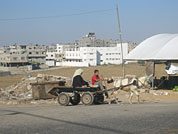
You can find an overview of ongoing debates with our journalists here. Please join us!
If you want to start a conversation about a topic raised in this article or want to report factual errors, email us at english@swissinfo.ch.